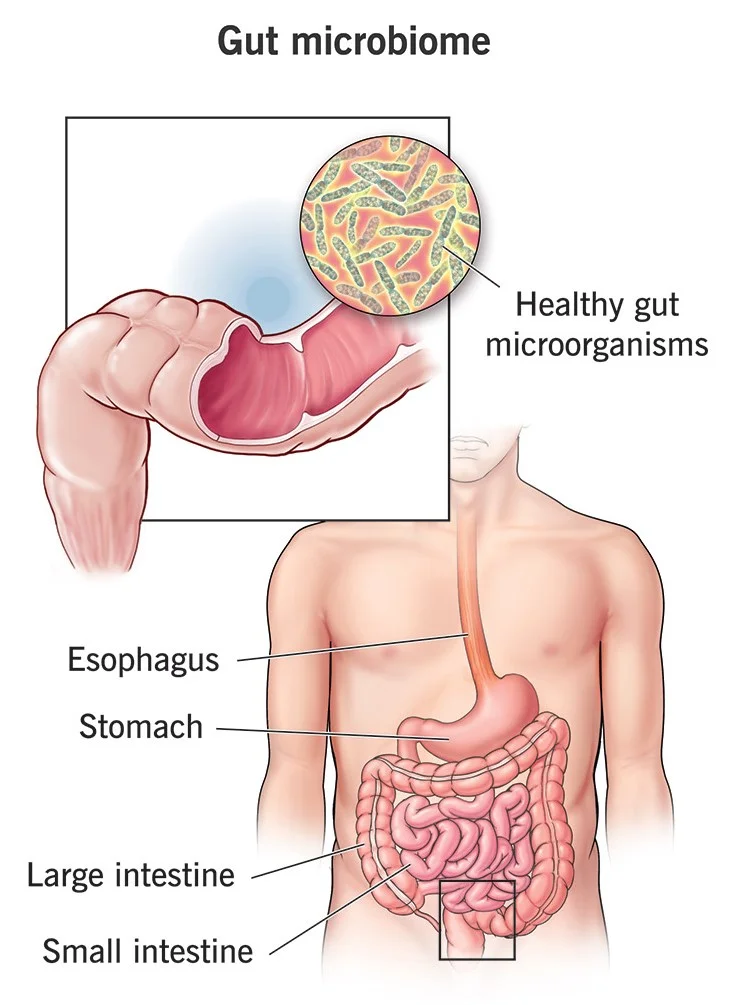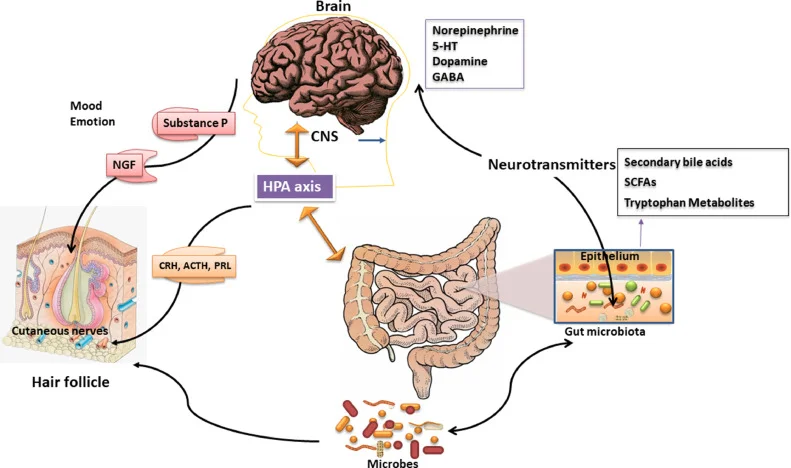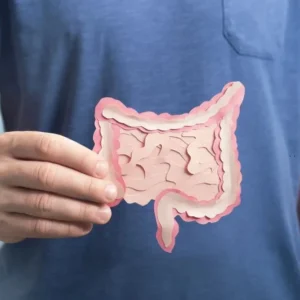Learn About the Link Between Gut Health and Hair Loss
In recent years, microbiome research has revolutionized our understanding of human health, revealing the profound impact of gut microbiota on various physiological processes. Amidst this burgeoning field, a fascinating connection has emerged between gut health and hair loss, challenging traditional perspectives on alopecia etiology. While genetic predisposition, hormonal imbalances, and environmental factors have long been recognized as contributors to hair loss, the gut microbiome’s role has garnered increasing attention as a key determinant of hair follicle integrity. The gastrointestinal tract, home to a diverse array of microorganisms, orchestrates intricate molecular signaling pathways that not only influence nutrient absorption and immune regulation but also modulate systemic inflammation and neuroendocrine signaling. Consequently, disturbances within the gut ecosystem, such as dysbiosis or altered microbial diversity, may predispose individuals to hair follicle miniaturization and aberrant cycling. Moreover, bidirectional communication between the gut and the skin, mediated by gut microbiota-derived metabolites and neuropeptides, suggests a complex interplay between gut health and cutaneous physiology. As research into the gut-hair axis advances, the therapeutic implications of this paradigmatic shift hold promise for novel interventions aimed at mitigating hair loss through targeted modulation of gut microbiota composition, dietary optimization, and stress management. Thus, understanding the intricate relationship between gut health and hair follicle dynamics not only expands our comprehension of alopecia pathology but also underscores the potential for personalized approaches to hair loss management grounded in gut-centered medicine.
UNDERSTANDING HAIR LOSS
Hair loss, or alopecia, manifests in various forms, each with its unique pathophysiological mechanisms. The most common type, androgenetic alopecia, is predominantly genetically determined and characterized by a progressive thinning of hair follicles in a specific pattern, typically at the frontal and crown regions of the scalp. This hereditary predisposition arises from the interplay of multiple genetic variants influencing follicular sensitivity to dihydrotestosterone (DHT), a derivative of testosterone implicated in hair follicle miniaturization. Concurrently, hormonal imbalances, particularly fluctuations in androgen levels, exert a significant influence on hair growth cycles. Elevated levels of DHT, coupled with diminished follicular blood supply, shorten the anagen (growth) phase and prolong the telogen (resting) phase, leading to the gradual depletion of hair density.
Beyond genetic determinants, hormonal fluctuations play a pivotal role in various forms of alopecia. Telogen effluvium, for instance, is often precipitated by acute physiological stressors or hormonal changes, such as childbirth, illness, or thyroid dysfunction, which disrupt the natural hair growth cycle, inducing premature shedding. Similarly, alopecia areata, an autoimmune condition characterized by patchy hair loss, reflects dysregulated immune responses targeting hair follicles, triggered by genetic predisposition and environmental triggers. Stress, whether physiological or psychological, further exacerbates hair loss by precipitating hormonal imbalances and fostering a pro-inflammatory milieu, thereby perpetuating follicular damage.
Moreover, nutrient deficiencies, notably iron, zinc, vitamin D, and biotin, have been implicated in hair loss pathogenesis. These micronutrients play essential roles in hair follicle development, pigmentation, and structural integrity, rendering deficiencies detrimental to hair health. Importantly, the gut microbiome acts as a crucial mediator in nutrient absorption and metabolism, underscoring its relevance to hair loss. Dysbiosis or impaired gut health may compromise nutrient assimilation, exacerbating deficiencies implicated in alopecia. Furthermore, emerging evidence suggests that gut dysbiosis can contribute to systemic inflammation, oxidative stress, and hormonal dysregulation, all of which are implicated in hair loss pathology. Thus, understanding the intricate interplay between genetic predisposition, hormonal imbalances, nutrient deficiencies, and gut health is essential for elucidating the multifaceted etiology of alopecia and developing comprehensive therapeutic strategies to mitigate its impact on individuals’ quality of life.
THE GUT MICROBIOME
The gut microbiome, comprising trillions of microorganisms inhabiting the gastrointestinal tract, constitutes a dynamic ecosystem pivotal to human health and homeostasis. Comprising predominantly bacteria, along with archaea, viruses, and fungi, this diverse microbial community plays multifaceted roles in host physiology, extending far beyond conventional notions of digestion. Central to its functionality is its pivotal role in nutrient metabolism and energy extraction, facilitating the breakdown of complex dietary components such as fiber and polysaccharides into absorbable substrates and producing essential vitamins and short-chain fatty acids vital for host health.
Moreover, the gut microbiome exerts profound influence over immune regulation, orchestrating complex interactions with the host immune system that are integral to both protective immunity and immune tolerance. Through mechanisms such as competitive exclusion and immune modulation, commensal gut microbes contribute to the maintenance of gut barrier integrity and mucosal immune homeostasis, thereby safeguarding against pathogen invasion and inflammatory disorders.

Beyond its role in digestion and immunity, the gut microbiome interfaces with various physiological systems, including the central nervous system (CNS), via the gut-brain axis. Bidirectional communication pathways between the gut and the CNS, mediated by neural, hormonal, and immunological signals, facilitate cross-talk between gut microbes and the brain, influencing mood, cognition, and behavior. Additionally, the gut microbiome contributes to the synthesis of neurotransmitters and neuromodulators, such as serotonin and gamma-aminobutyric acid (GABA), further underscoring its impact on mental health and well-being.
Various factors influence gut health and the composition of the gut microbiome, including diet, medication use, environmental exposures, and lifestyle factors. Dietary patterns rich in fiber, prebiotics, and fermented foods promote microbial diversity and resilience, whereas diets high in processed foods and saturated fats can perturb gut microbiota composition and function. Antibiotic use, while often necessary for combating infections, can disrupt microbial equilibrium and increase susceptibility to colonization by opportunistic pathogens, highlighting the importance of judicious antibiotic stewardship. Furthermore, stress, sleep disturbances, and physical inactivity have been shown to impact gut microbial composition and gut barrier function, underscoring the bidirectional relationship between gut health and overall well-being.
The gut microbiome represents a dynamic ecosystem with far-reaching implications for human health and disease. Its multifaceted roles in digestion, immunity, and neurobehavioral regulation underscore its significance in maintaining overall well-being. By understanding the factors that influence gut health and microbiome composition, we can harness the therapeutic potential of modulating the gut microbiome to promote health and mitigate disease.
THE GUT-HAIR AXIS
The Gut-Hair Axis represents a novel paradigm in understanding the multifaceted relationship between gut health and hair loss, transcending traditional silos of physiological inquiry. At its core, this concept posits that the composition and functionality of the gut microbiome intricately influence the health and vitality of hair follicles, thereby implicating gut health as a critical determinant of hair integrity. Research elucidating the mechanisms underpinning this axis has unearthed compelling insights into the interplay between gut microbiota dynamics and hair loss pathology, spanning diverse physiological domains.

A growing body of evidence underscores the profound influence of gut microbiota on systemic inflammation and immune responses, which play pivotal roles in hair follicle biology. Dysbiosis, characterized by imbalances in gut microbial composition and diversity, can foster a pro-inflammatory milieu conducive to follicular damage and hair loss. Conversely, modulation of gut microbiota through interventions such as probiotic supplementation has shown promise in mitigating inflammation and ameliorating alopecia symptoms, underscoring the therapeutic potential of targeting the gut microbiome in hair loss management.
Furthermore, gut dysbiosis can compromise nutrient absorption and metabolism, thereby exacerbating deficiencies implicated in hair loss pathogenesis. Micronutrients essential for hair follicle development and function, including iron, zinc, and biotin, rely on optimal gut health for efficient absorption. Consequently, disturbances within the gut ecosystem may compromise nutrient availability to hair follicles, predisposing individuals to hair thinning and loss.
Moreover, the gut-brain axis, a bidirectional communication pathway linking the gut microbiota with the central nervous system, holds implications for stress-related hair loss. Stress-induced alterations in gut microbial composition and gut barrier function can potentiate systemic inflammation and neuroendocrine dysregulation, thereby exacerbating hair follicle dysfunction. Notably, interventions aimed at modulating the gut-brain axis, such as stress management techniques and dietary interventions, may offer promising avenues for mitigating stress-related alopecia.
Case studies further underscore the clinical relevance of the Gut-Hair Axis, illustrating the tangible impact of gut health on hair loss outcomes. Observations of improved hair regrowth following interventions targeting gut microbiota modulation or dietary optimization provide compelling evidence of the intricate interplay between gut health and hair follicle integrity. By elucidating the mechanisms underlying this axis and its implications for hair loss pathology, we pave the way for innovative therapeutic strategies grounded in the principles of gut-centered medicine, thereby offering new hope for individuals grappling with alopecia.
STRATEGIES FOR IMPROVING GUT HEALTH TO TREAT HAIR LOSS
Addressing gut health represents a promising avenue for the management of hair loss, encompassing a multifaceted approach grounded in dietary optimization, lifestyle modifications, and targeted supplementation. At the forefront of gut health interventions lies the importance of maintaining a balanced diet rich in fiber, prebiotics, and essential nutrients crucial for both gut and hair follicle health. Incorporating foods such as fruits, vegetables, whole grains, and legumes provides the necessary substrates to nourish beneficial gut microbes and promote microbial diversity, thereby fostering a resilient gut ecosystem conducive to hair growth.
Certain foods boast specific properties that confer dual benefits for gut health and hair growth. For instance, probiotic-rich foods like yogurt, kefir, and fermented vegetables contain beneficial bacteria that promote gut microbial balance and enhance nutrient absorption, thereby supporting hair follicle integrity. Likewise, foods rich in omega-3 fatty acids, such as fatty fish, flaxseeds, and walnuts, exhibit anti-inflammatory properties that mitigate systemic inflammation and oxidative stress, which are implicated in hair loss pathology.

In addition to dietary interventions, lifestyle modifications play a pivotal role in nurturing gut health and ameliorating hair loss symptoms. Stress management techniques, including mindfulness meditation, yoga, and deep breathing exercises, help alleviate stress-induced gut dysbiosis and mitigate stress-related hair loss. Adequate sleep hygiene, regular exercise, and hydration further contribute to gut health by optimizing gut motility and promoting microbial diversity.
Furthermore, avoiding gut-disrupting factors, such as excessive alcohol consumption, smoking, and prolonged antibiotic use, is essential for preserving gut microbial balance and mitigating hair loss. These lifestyle practices can perturb gut microbiota composition and compromise gut barrier function, predisposing individuals to inflammation and nutrient malabsorption, both of which are implicated in hair follicle dysfunction.
Supplementation with probiotics and prebiotics offers a targeted approach to improving gut health and reducing hair loss symptoms. Probiotic supplements containing strains such as Lactobacillus and Bifidobacterium have been shown to modulate gut microbiota composition, reduce inflammation, and enhance nutrient absorption, thereby promoting hair follicle health. Similarly, prebiotics, such as oligosaccharides and inulin, serve as fuel for beneficial gut microbes, fostering their growth and proliferation, and supporting gut barrier integrity. Clinical studies have provided evidence supporting the efficacy of probiotic and prebiotic supplementation in improving gut health parameters and ameliorating hair loss symptoms, underscoring their potential as adjunctive therapies in hair loss management.
A comprehensive approach to improving gut health holds promise for addressing hair loss, offering a synergistic interplay of dietary, lifestyle, and supplementation strategies. By nurturing a resilient gut ecosystem, individuals can mitigate inflammation, optimize nutrient absorption, and support hair follicle integrity, thereby fostering healthy hair growth and enhancing overall well-being.
CONCLUSION
The intricate interplay between gut health and hair loss elucidates a compelling nexus between seemingly distinct physiological systems. As our understanding of the Gut-Hair Axis deepens, it becomes increasingly evident that gut health represents a pivotal determinant of hair follicle integrity and hair loss pathology. The multifaceted roles of the gut microbiome in modulating inflammation, nutrient metabolism, and stress responses underscore its significance in maintaining cutaneous homeostasis and promoting healthy hair growth.
By embracing a holistic approach to hair loss management that prioritizes gut health, individuals can leverage dietary, lifestyle, and supplementation interventions to foster a resilient gut ecosystem conducive to hair follicle health. Incorporating a balanced diet rich in fiber, probiotics, and essential nutrients, while minimizing gut-disrupting factors, offers a foundation for nurturing gut microbial diversity and supporting hair growth. Furthermore, lifestyle modifications such as stress management techniques and regular exercise complement dietary interventions by mitigating stress-induced gut dysbiosis and promoting overall well-being.
The therapeutic potential of probiotic and prebiotic supplementation further underscores the promise of gut-centered approaches in hair loss management. Clinical evidence supporting the efficacy of these interventions in improving gut health parameters and reducing hair loss symptoms reinforces their role as valuable adjuncts to conventional treatments.
Ultimately, by recognizing the intricate relationship between gut health and hair loss, individuals can empower themselves to adopt proactive strategies that address the root causes of hair follicle dysfunction. Through continued research and awareness, the Gut-Hair Axis promises to unlock new vistas for personalized approaches to hair loss management, offering renewed hope for individuals seeking to restore not only their hair but also their confidence and quality of life.
SHOP FOR HAIR LOSS TREATMENTS


